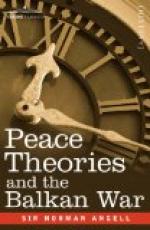Now while as an “abstract proposition” everyone will admit that the one thing which distinguishes the civilized man from the savage is a difference of ideas, no one apparently believes that it is a dangerous and evil thing for the political ideas of savages to dominate most of our countrymen or that so intangible a thing as “ideas” have any practical importance at all. While we believe this, of course—to the extent to which we believe it—improvement is out of the question. We have to realize that civic faith, like religious faith, is of importance; that if English influence is to stand for the right and not the wrong in human affairs, it is impossible for each one of us individuals to be wrong; that if the great mass is animated by temper, blindness, ignorance, passion, small and mean prejudices, it is not possible for “England” to stand for something quite different and for its influence to be ought but evil. To say that we are “for our country right or wrong” does not get over the matter at all; rather is it equivalent to saying that we would as readily have it stand for evil as for good. And we do not in the least seem to realize that for an Englishman to go on talking wicked nonsense across the dinner table and making one of the little rivulets of bad temper and prejudice which forms the mighty river drowning sane judgment is to do the England of our dreams a service as ill (in reality far more mischievous) as though the plans of fortresses were sold to Germany. We must all learn to shoot straight; apparently we need not learn to think straight. And yet if Europe could do the second it could dispense with the first. “Good faith” has a score of connotations, and we believe apparently that good politics can dispense with all of them and that “Patriotism” has naught to do with any.
Of course, to shoot straight is so much easier than to think straight, and I suppose at bottom the bellicist believes that the latter is a hopeless object since “man is not a thinking animal.” He deems, apparently, we must just leave it at that. Of course, if he does leave it at that—if we persist in believing that it is no good discussing these matters, trying to find out the truth about them, writing books and building churches—our civilization is going to drift just precisely as those other civilizations which have been guided by the same dreadful fatalism have drifted—towards the Turkish goal. “Kismet. Man is a fool to babble of these things; what he may do is of no avail; all things will happen as they were pre-ordained.” And the English Turk—the man who prefers to fight things out instead of thinking things out—takes the same line.
If he adopts the Turkish philosophy he must be content with the Turkish result. But the Western world as a whole has refused to be content with the Turkish result, and however tiresome it may be to know about things, to bother with “theories” and principles, we have come to realise that we have to choose between one of two courses: either to accept things as they are, not to worry about improvement or betterment at all, fatalistically to let things slide or—to find out bit by bit where our errors have been and to correct those errors. This is a hard road, but it is the road the Western world has chosen; and it is better than the other.




